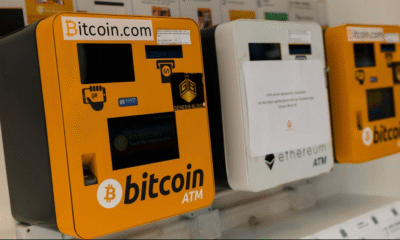Cryptocurrency
Large companies and government taking a keen interest in cryptocurrency: Darshan Bathija
Even the safest of financial instruments has some degree of risk attached to it, and any investment strategy needs to be based on sound reasoning and good information, cryptocurrency included, says Darshan Bathija CEO of Vauld – a cryptocurrency exchange and lending platform.
In an interaction with MyBigPlunge, Darshan Bathija discusses the controversial cryptocurrency and its outlook:
It has taken over a decade for cryptocurrency to create ripples in the market. Why has it taken so many years?
Any new technology can take some time before adoption, particularly something like cryptocurrencies which involves an intersection between two complex fields – technology and finance. It’s taken a while for different stakeholders including both retail and larger investors to fully begin to understand the scope of what cryptocurrencies can actually do. Additionally, the earliest stages of cryptocurrency development involved a lot of hesitation from different global market regulators. Now that more and more major figures including hedge funds, large companies like Tesla, and even governments are starting to look to see how to engage with cryptocurrencies and looking to see how to diversify and explore new financial frontiers, you start to see momentum.
Why is there still the risk factor surrounding cryptocurrency?
Cryptocurrencies are still a relatively new idea, and that can make for a volatile market as different stakeholders figure out how to incorporate them into their financial systems. Regulations on cryptocurrency usage is still being figured out and since there’s no international standard yet. You also have a wide number of cryptocurrencies being created constantly, making it difficult at times to assess what has value and what doesn’t. As the market defines itself, that risk factor will surely minimise.
Are cryptocurrency “safe” to invest in? Is investment in gold and cryptocurrency comparable?
Even the safest of financial instruments has some degree of risk attached to it, and any investment strategy needs to be based on sound reasoning and good information, cryptocurrencies included. A lot of people make comparisons between gold and cryptocurrencies and certainly there are some similarities (for instance in the manner some people have used both gold and some cryptocurrencies as a hedge during the pandemic). It’s important to treat them as separate instruments, however, and expect their behaviours to be different.
The Indian government and the RBI over the years have been very much shy and brutal of cryptocurrency. The government, in the announcement of the 2021-22 Budget, had also highlighted a crypto Bill whereby the Central Bank would be introducing a national crypto. And there were also talks of a blanket ban on investment on Bitcoin and its like. What are your views on this?
India’s financial regulatory systems have always been focused on ensuring both that investor’s rights are protected and that sound financial markets are developed. That process of figuring out the balance can take time, however. While some elements of policy over the last few years have not been as positive as many in the space would like, there’s also a lot to be optimistic about. For starters, we’ve had some favourable Supreme Court rulings as well as some positive opinions coming from respected senior financial players. The cryptocurrency scene is constantly growing, and proponents of the technology are speaking about its usefulness at an ever-increasing volume. India’s also recently been highly innovative in the fintech space – look at the speed and pace with which the UPI system was developed and adopted, for instance.
Earlier in the year, Elon Musk gave some relief to crypto enthusiasts by investment in Bitcoin, as well as saying that Tesla cars can be bought using Bitcoin. Should other industries and businesses do the same? Should the world be open to use cryptocurrency like fiat currency?
We had people buying pizzas using Bitcoin as early as in 2010. Now you have payment systems like PayPal beginning to allow crypto-based checkout services. Any move to diversify and simplify the way people can buy and sell goods will be a positive thing for industries, and should certainly be welcomed.
Why is only a certain age group or rather the tech-savvy interested in cryptocurrency?
It’s not really an age-related issue so much as it is a risk- and awareness-related issue. If you look at something like Mutual Funds, for a certain type of investor even that seems much riskier to engage with, even though common wisdom now suggests that Mutual Funds should be a core component of any investment strategy and we have more and more people adopting those funds every day. Part of that process has been due to the evolution of tech platforms that help simplify the investment process to become more inclusive. Vauld is a platform that helps all people buy and deposit crypto, get the best interest rates on it automatically and trade crypto towards the aim of long term wealth building.
Will the government and the world eventually accept cryptocurrency like their normal every-day currency? Is it right to compare cryptocurrency with the regular (fiat) currency?
It’s still too early to know what form the cryptocurrency market will eventually look like; it’s an evolving process. However, what is known is that cryptocurrencies are here to stay, and that every day more people are starting to engage with them. Governments tend to be responsive to the demands of their people, and so there’s more than enough reason to be optimistic in imagining a world where cryptocurrencies have reached a peak level of public acceptance.











































Pingback: Agriculture Insurance Company of India collaborates with Gramcover for rural insurance | The Plunge Daily